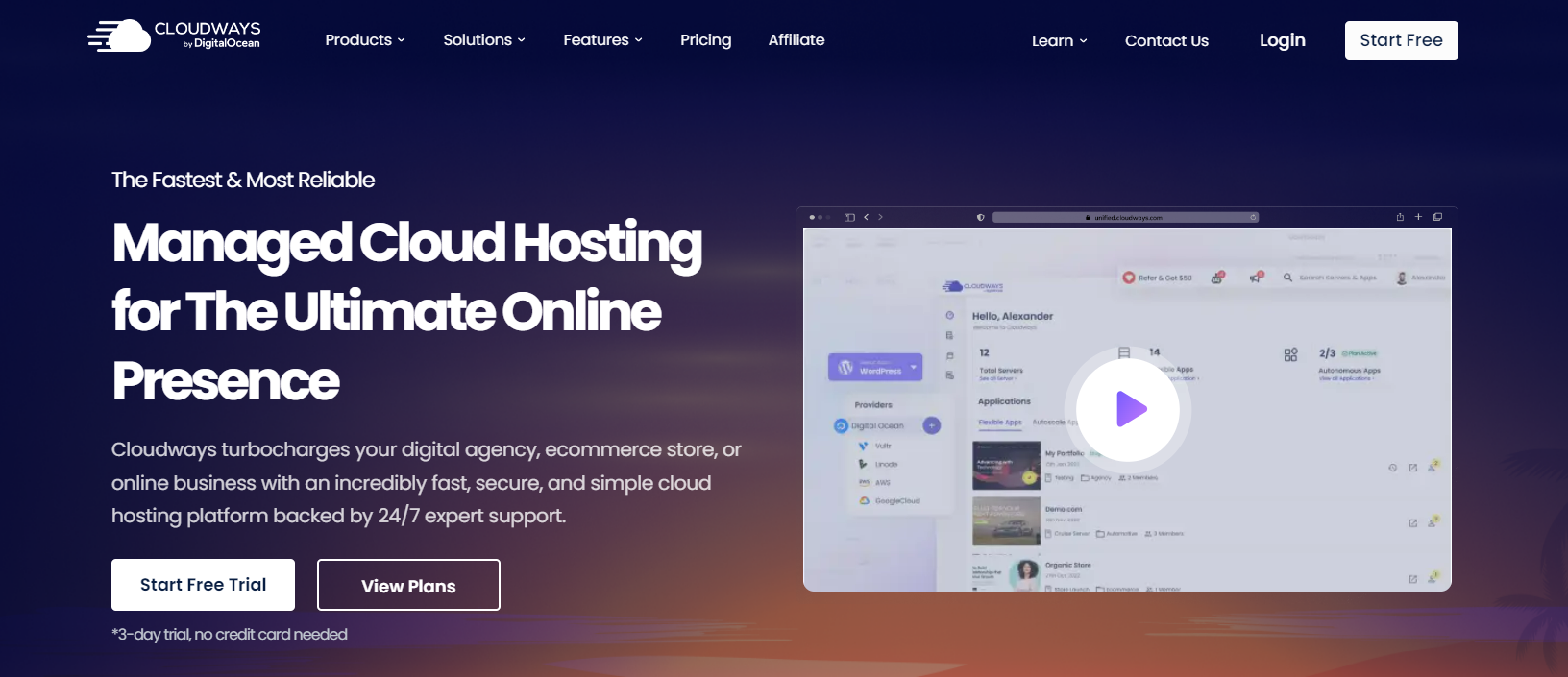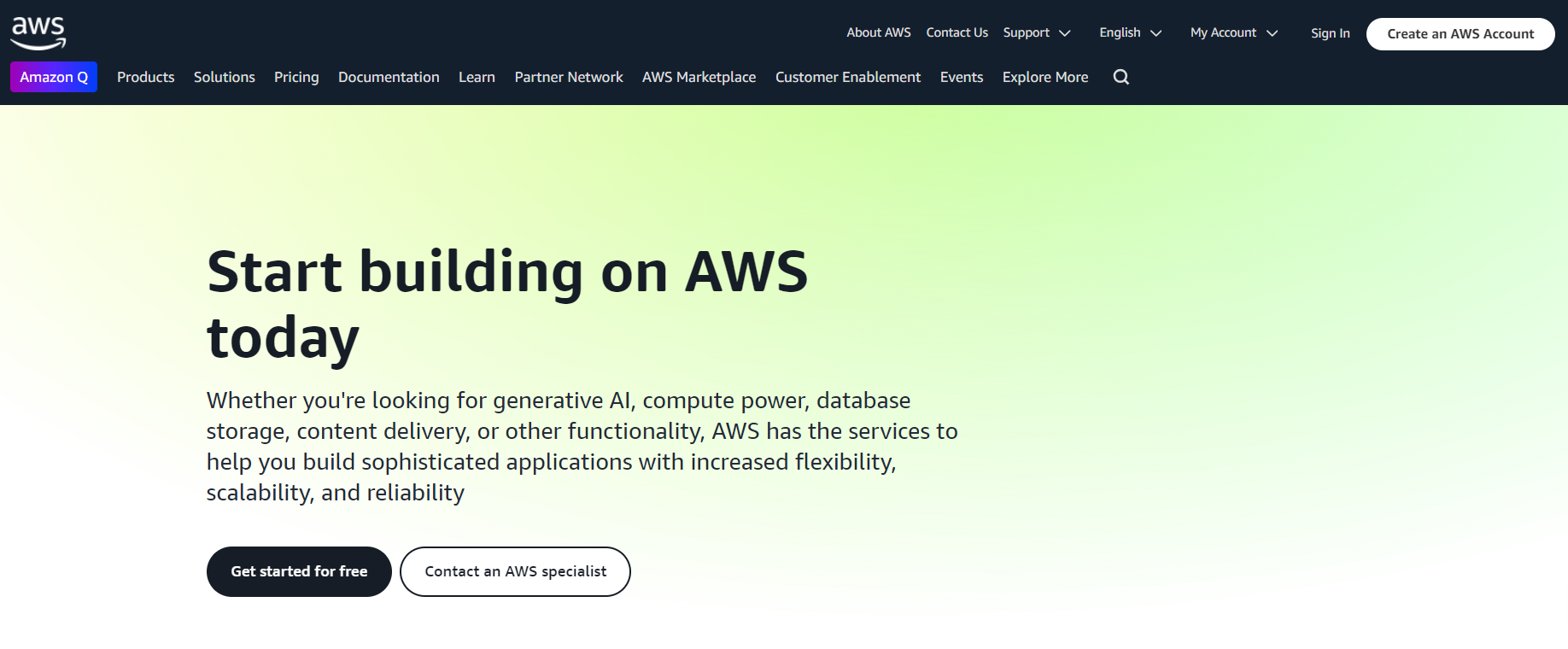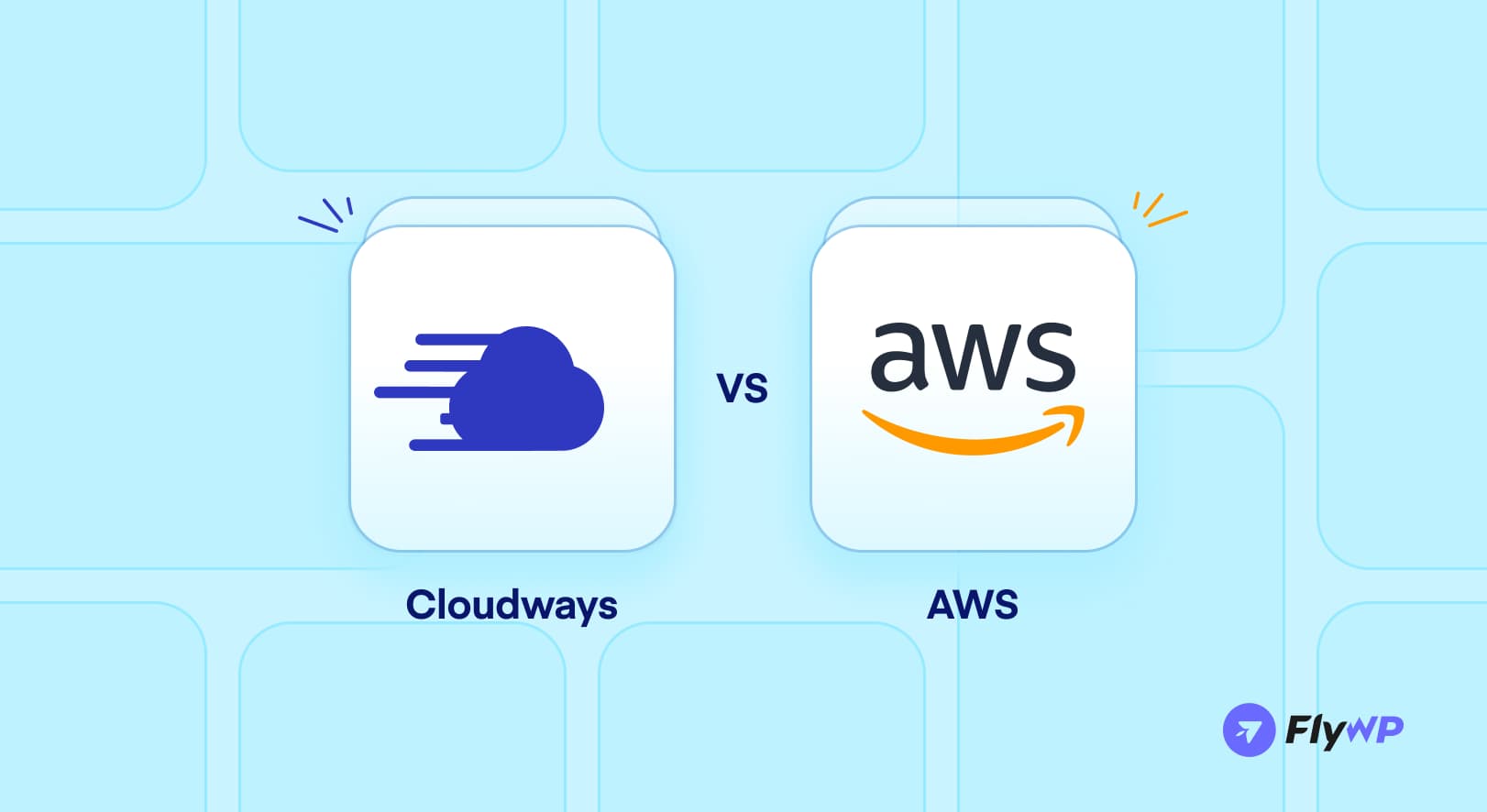With the global cloud computing market projected to reach over $832 billion by 2025, businesses increasingly seek cloud hosting solutions to power their online operations.
As cloud technology continues to progress day by day, choosing the right platform is more critical than ever, influencing everything from site performance to scalability and costs.
Two of the most talked-about options are Cloudways and Amazon Web Services (AWS). Both platforms offer robust cloud hosting, but they cater to different types of users and needs. In this blog, we will compare Cloudways and AWS across several key factors such as performance, pricing, ease of use, scalability, and support, helping you determine which platform is the best fit for your business.
This comparison will help you navigate the complexities of cloud hosting and make an informed decision based on your specific requirements and your business goals.
What is Cloudways?

Cloudways is a managed cloud hosting platform designed to simplify the process of hosting websites and applications on the cloud. Unlike traditional hosting providers where you manage everything on your own, Cloudways handles most of the technical aspects for you, allowing you to focus on your core business.
Cloudways gives you access to several leading cloud providers, including AWS, Google Cloud, and DigitalOcean, through a user-friendly interface that makes server management accessible even for non-technical users.
Key features:
- Multi-cloud hosting: Cloudways allows you to choose from multiple cloud providers, giving you flexibility in selecting the best infrastructure for your needs. This feature is particularly useful if you want to leverage the strengths of different cloud providers, such as AWS’s scalability or Google Cloud’s data analytics capabilities.
- Managed services: One of the standout features of Cloudways is its managed services. This means that Cloudways takes care of server maintenance, security updates, and performance optimizations, reducing the burden on you or your IT team.
With managed backups, monitoring, and updates, you can rest assured that your website is running smoothly without having to dive into the technical details.
- 1-Click Installs: Cloudways offers a simplified setup process with 1-click installations for popular applications like WordPress, Magento, and Joomla. This feature is ideal for businesses that want to get up and running quickly without worrying about the complexities of installation and configuration.
Best for
- Small to medium-sized businesses: Cloudways is particularly well-suited for small to medium-sized businesses that need robust hosting but don’t have the technical expertise or resources to manage servers.
- Non-technical users: If you prefer a hands-off approach to server management, Cloudways is an excellent choice. The platform is designed to be intuitive, allowing you to focus on your business rather than worrying about server uptime, security patches, or performance issues.
What is AWS?

Amazon Web Services (AWS) is a leading cloud computing platform that provides a wide range of services designed to help businesses manage their operations online.
AWS offers everything from basic computing power and storage to advanced database management and artificial intelligence services. The platform is renowned for its scalability, allowing businesses to easily adjust their resources as they grow or as their needs change.
Key features:
- Extensive services: AWS offers over 200 cloud services that cover a broad spectrum of needs. These include:
- EC2 (Elastic Compute Cloud): Provides scalable computing power in the cloud, allowing businesses to run virtual servers and applications with ease.
- S3 (Simple Storage Service): A highly durable and scalable storage solution that businesses use to store and retrieve any amount of data at any time.
- RDS (Relational Database Service): Simplifies database management with support for multiple database engines like MySQL, PostgreSQL, and Oracle.
- Global infrastructure: AWS has a vast global network of data centers, known as availability zones, spread across different geographic regions. This extensive infrastructure ensures that your applications and data are always available, no matter where your users are located.
- Customization: One of the standout features of AWS is the level of control it offers. Businesses can fully customize their cloud environment to meet their specific needs.
Ideal for:
- Large enterprises: AWS is particularly well-suited for large organizations that have complex IT needs. The platform’s scalability and wide range of services allow these businesses to handle massive workloads and complex applications with ease.
- Technical users: AWS is ideal for users with a strong technical background who want full control over their cloud infrastructure. The platform provides a wealth of tools and customization options, making it a favorite among developers and IT professionals who need flexibility and power.
Cloudways vs AWS: A detailed comparison
Choosing the right cloud hosting platform is a significant decision that can greatly influence your business’s performance, scalability, and success. While both Cloudways and AWS offer powerful cloud hosting solutions, they cater to different types of users and business needs. Cloudways excels in simplicity and managed services, making it an excellent choice for small to medium-sized businesses and non-technical users.
In contrast, AWS is a leader in the cloud computing industry, offering extensive customization and scalability options ideal for large enterprises and technical users.
In this section, we will thoroughly explore the key factors that differentiate Cloudways and AWS, helping you determine which platform might best suit your specific requirements. From performance and pricing to ease of use and support, this detailed comparison will provide the insights you need to make an informed decision.
01. Performance
| Parameter | Cloudways | AWS |
| Server Speed | Managed performance optimization, SSD-based hosting | High-performance infrastructure with global data centers |
| Uptime | 99.99% uptime with managed services | 99.99% uptime with advanced redundancy features |
| Reliability | Automatic backups, server monitoring, and security patches | Highly resilient with multiple availability zones and automatic failover |
Analysis:
- Cloudways offers excellent performance with managed services that ensure your server is optimized and secure, making it a great choice for users who prefer not to handle these tasks themselves.
- AWS, on the other hand, offers top-tier performance and reliability, especially for businesses that need full control over their infrastructure.
02. Pricing
| Parameter | Cloudways | AWS |
| Pricing Model | Managed pricing with fixed monthly costs | Pay-as-you-go, with variable costs depending on usage |
| Starting Price | It starts at $10/month on DigitalOcean | Flexible, but can be as low as a few dollars per month depending on usage |
| Cost Predictability | High; predictable costs | Variable; costs can fluctuate based on usage |
Analysis:
- Cloudways offers predictable, fixed pricing, making it easier for small businesses to budget their hosting expenses.
- AWS, with its pay-as-you-go model, can be more cost-effective for specific use cases but requires careful monitoring to avoid unexpected costs.
03. Ease of use
| Parameter | Cloudways | AWS |
| User Interface | Simplified dashboard with a focus on ease of use | Comprehensive but complex management console |
| Learning Curve | Minimal; designed for non-technical users | Steep; requires technical expertise |
| Managed Services | Fully managed hosting with automatic updates and backups | Unmanaged; user is responsible for all configurations |
Analysis:
- Cloudways is designed to be user-friendly, with a focus on simplicity and ease of use. It’s ideal for those who don’t have the technical skills to manage a server.
- AWS, however, is more suitable for users who have the technical knowledge to configure and manage their own cloud infrastructure.
04. Scalability
| Parameter | Cloudways | AWS |
| Vertical Scaling | Easy scaling through the dashboard | Highly customizable scaling options, both vertical and horizontal |
| Horizontal Scaling | Limited compared to AWS, but sufficient for most small to medium businesses | Extensive auto-scaling capabilities |
| Global Reach | Multi-cloud options, but not as extensive as AWS | Global data centers with advanced scaling options |
Analysis:
- AWS excels in scalability, offering powerful tools for both vertical and horizontal scaling.
- Cloudways also supports scaling, but it’s more straightforward and limited compared to AWS. Businesses expecting significant growth or fluctuating traffic may prefer AWS for its flexibility.
05. Support and customer service
| Parameter | Cloudways | AWS |
| Support Availability | 24/7 support via live chat, email, and tickets | Multiple support tiers, including 24/7 access for premium plans |
| Documentation | Extensive knowledge base and community support | Comprehensive documentation and large user community |
| Hands-On Assistance | Managed support with proactive monitoring | Available through premium support plans, but less personalized |
Analysis:
- Cloudways offers more personalized support, ideal for small businesses and non-technical users who may need hands-on help.
- AWS provides extensive documentation and various support plans, but the level of personalized support depends on the plan you choose.
06. Security features
| Parameter | Cloudways | AWS |
| Built-In Security | Managed security with firewalls, SSL, and regular updates | Advanced security options with IAM, encryption, and DDoS protection |
| Compliance | Complies with industry standards but depends on the cloud provider | Comprehensive compliance certifications (GDPR, HIPAA, etc.) |
| Backup and Recovery | Automated backups with options for on-demand backups | Flexible backup solutions, but require setup |
Analysis:
- Cloudways simplifies security management with built-in features, making it easier for non-technical users to ensure their site is secure.
- AWS offers more advanced security options and compliance certifications, making it suitable for businesses with strict security requirements.
A quick comparison: Cloudways vs. AWS
For businesses trying to decide between Cloudways and Amazon Web Services (AWS), this “At a Glance” table highlights the key differences and similarities.
Whether you are looking for ease of use, pricing flexibility, or specific features like managed services and free trials, this comparison will help you quickly understand which platform might be the best fit for your needs.
| Feature | Cloudways | AWS |
| Payment Options | Pay-As-You-Go (Monthly/Hourly) | Pay-As-You-Go, Reserved Instances, Volume-based pricing |
| Cloud Web Hosting Services | DigitalOcean, Linode, Vultr, AWS, Google Cloud | Amazon S3, Amazon EC2, Amazon Lightsail, Amazon Amplify |
| CDN | CloudwaysCDN | Available |
| Free SSL Certificates | Yes | Yes |
| PHP-Ready Servers | Yes | Yes |
| SSD Storage | Yes | Yes |
| Managed Security & Backups | Yes | No |
| Free Site Migration | Yes | No |
| Collaborative Tools | Yes | Yes |
| Free Trial | Cloudways provides a 3-day free trial without a credit card, with limited cloud provider options. During the free trial, you can choose from DigitalOcean, Linode, or Vultr as your cloud provider. | AWS offers a 12-month free trial with a free tier, which is significantly longer than Cloudways’ trial. |
| 24/7 Chat and Ticket Support | Yes | No (Support is tiered and costs extra) |
However, you can choose a better alternative to Cloudways | Cloudways vs FlyWP Comparison
Which platform is best for your business?
Small to medium businesses
For small to medium-sized businesses that need reliable hosting without the complexity of managing servers, Cloudways is an excellent choice. Its ease of use, predictable pricing, and managed services make it ideal for businesses that want to focus on growth without worrying about the technical details.
Large enterprises
For large enterprises with complex needs and the resources to manage their cloud infrastructure, AWS is a better fit. Its scalability, flexibility, and extensive service offerings make it a powerful platform for businesses that require full control over their cloud environment.
Specific Use Cases
- E-Commerce: Cloudways is great for small to medium e-commerce sites using platforms like WooCommerce or Magento.
- SaaS applications: AWS is ideal for SaaS businesses that need to scale quickly and require robust security and compliance features.
- Content-heavy websites: Both platforms can handle content-heavy websites, but AWS offers more customization for high-traffic sites.
Real-world use cases and testimonials
Understanding the practical applications of Cloudways and AWS can offer valuable insights into how each platform performs in real business environments.
Below are case studies and user testimonials that highlight the benefits and challenges of each platform.
Case Studies
1. Small business: A small e-commerce business running WooCommerce was struggling with slow site speed and low conversion rates on a traditional shared hosting provider. After migrating to Cloudways, the company reported significant improvements:
- Improved site speed: The business saw a 40% increase in site speed, attributed to Cloudways’ optimized server performance, SSD storage, and integrated caching solutions like Varnish, Memcached, and Redis. This faster load time enhanced the user experience, reducing bounce rates and keeping customers on the site longer.
- Increased conversions: The improved speed and performance led to a 25% increase in conversions. The smoother and quicker checkout process made it easier for customers to complete purchases, directly boosting the company’s revenue. This case shows how Cloudways’ managed services can significantly benefit small businesses, especially in e-commerce, where speed and user experience are crucial.
2. Enterprise: A large financial services company needed a robust cloud hosting solution capable of handling millions of transactions per day, with a strong emphasis on security and uptime. They opted for AWS due to its unparalleled scalability and comprehensive security features:
- Scalability: AWS allowed the company to scale its operations seamlessly. With features like auto-scaling and Elastic Load Balancing, they could adjust resources as needed, ensuring the system could handle large transaction volumes without any downtime. This was particularly useful during peak periods, such as financial quarter-end reporting.
- Security: Security was a top priority, and AWS delivered with robust offerings, including Identity and Access Management (IAM), encryption, and compliance with industry standards like PCI DSS. AWS’s global data centers also provided redundancy and disaster recovery options, ensuring data integrity and availability. This case highlights AWS’s ability to manage large-scale, security-sensitive operations, making it ideal for enterprises with complex needs.
User testimonials
1. Cloudways: “Cloudways made it easy for us to manage our online store without worrying about server issues. Their support team is always available and very helpful.”
This testimonial reflects Cloudways’ focus on user-friendliness and reliable customer support. Small businesses and non-technical users find Cloudways especially beneficial because it allows them to concentrate on growing their business instead of dealing with technical problems.
2. AWS: “AWS provided the flexibility and power we needed to scale our SaaS platform globally. The learning curve was steep, but the results were worth it.”
AWS is praised for its flexibility and ability to scale globally, making it a top choice for businesses with complex requirements. However, the steep learning curve is a common challenge, indicating that AWS is best suited for users with technical expertise. Despite this, the platform’s robust performance and extensive service offerings make it a valuable asset for businesses looking to scale.
These case studies and testimonials illustrate how Cloudways and AWS serve different types of businesses. Cloudways excels in providing managed services and ease of use, making it a great choice for small to medium-sized businesses.
AWS, with its scalability and extensive features, is more suited to large enterprises with complex needs and the resources to manage a sophisticated cloud environment.
The final words
These real-world examples and user testimonials provide a clear picture of how Cloudways and AWS serve different business needs. Cloudways excels in providing managed services that simplify cloud hosting, making it a great choice for small to medium-sized businesses. AWS, with its extensive service offerings and scalability, is better suited for large enterprises and technical users who need a highly customizable and robust cloud platform.
When choosing between these two platforms, consider your business’s specific requirements, technical expertise, and long-term goals.
Ultimately, the best choice comes down to your specific use case. If you’re a small business owner looking for simplicity and managed services, Cloudways is likely your best bet. But if you’re running a large enterprise with complex needs and have the resources to manage a more sophisticated cloud environment, AWS could be the better option.
Whatever your decision, both platforms offer powerful tools to help your business succeed online. Carefully consider the strengths and challenges of each to make an informed choice that aligns with your business objectives.
Some common FAQs on – Cloudways vs. AWS
01. What are the key differences between Cloudways and AWS?
Cloudways: Managed platform with simplified setup and management, fixed monthly pricing, including SSL, CDN, backups, and security by default.
AWS: Requires technical expertise, pay-as-you-go pricing, and services like SSL, CDN, and backups need manual configuration.
02. Is Cloudways more expensive than AWS?
Cloudways: Offers straightforward pricing but may be costlier for the same resources, especially on AWS plans starting at $36.51/month.
AWS: Pay-as-you-go pricing can be more economical for large-scale usage.
03. What are the pros and cons of each platform?
Cloudways:
Pros: Easy setup, managed services, supports multiple cloud providers.
Cons: Higher costs, less control.
AWS:
Pros: Cost-effective for large-scale, scalable, vast service ecosystems.
Cons: Steep learning curve, more manual setup required.
04. Which platform is better for beginners?
Cloudways: Better for beginners due to its user-friendly interface and managed services.
AWS: Better suited for experienced developers or teams with technical expertise.
05. Can I run WordPress on both platforms?
Yes, both platforms support WordPress hosting. Cloudways offers one-click installs, while AWS requires manual setup or using services like Lightsail.
06. What are some alternatives to Cloudways and AWS?
Managed Platforms: DigitalOcean App Platform, Google Cloud Run, Heroku.
Cloud Infrastructure: Google Cloud Platform, Microsoft Azure, IBM Cloud, Oracle Cloud.
The choice depends on your specific needs, budget, and technical skills.

Add your first comment to this post